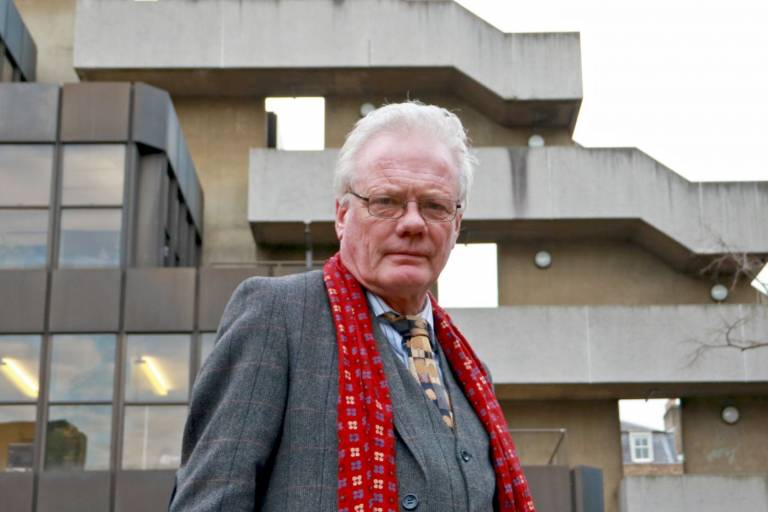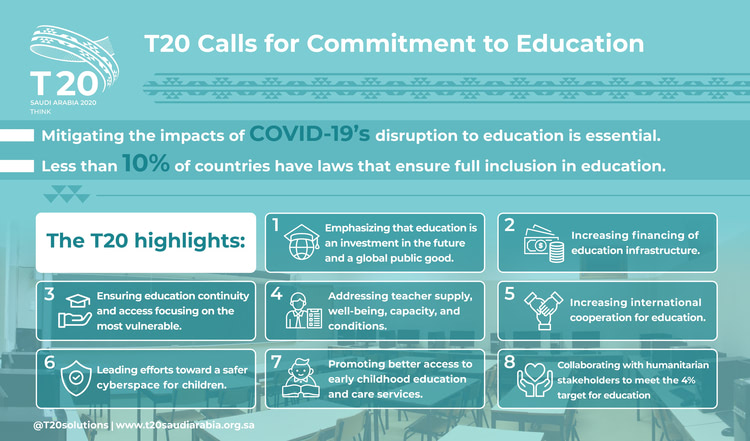Global Educational Policies must be underpinned by new social contracts and a renewed emphasis on ethics

The impact of the #G20 2020, on Global Educational Policies @G20org
The #G20RiyadhSummit concluded yesterday (22 Nov) with a global, but virtual conversation.
Proposals on Education have been developed by the T20, the ‘Think Tank’ arm.
This, with the G20, will transfer from the Saudi Arabian Presidency to the Italian Presidency on Nov 30th.

Let us take stock of 2020.
During the inaugural meeting in January 2020 there was a growing but distant threat of a new virus. COVID was declared a global health emergency of 30 January 9 days after we boarded our flights home. Since then the pandemic has dominated global thinking.
Wisely, Saudi Arabia relaxed its agenda and provided a global platform from which to consider the impact of the virus across the range of G20 activity.
It was soon appreciated, and became the established view, that while disruptive and for many tragic, the pandemic has hastened processes that were already in train. The T20 agreed.
The aphorism ‘Build Back Better’, borrowed from the 2015 Third UN World Conference on Disaster Risk Reduction and widely hijacked since, came to reflect a consensus view.
The final Communique, (T20 Communique) published on 6 November, captures this well.
In seeking a ‘future of prosperity, sustainability and inclusion’ two paradigms have emerged:
- The need to work together, globally, is greater than ever and that
- Coordinated action must embrace structural reform
These are simple to state, but the discussion within the 11 Task Forces established within the T20 becomes more nuanced within the text of the Communique.
The need for multi-lateral action, for example, is not seen as a justification for authoritarianism. The case is made for decentralised, but co-ordinated action.
This needs to be cross sectoral: previous structures have been overly confined in silos. Deficits in infrastructure, physical and virtual must be challenged.
Structural reform should not be seen in simply institutional arrangements but must be underpinned by new social contracts.

Drawing upon the 146 Policy Briefs prepared by the Task Forces the Communique makes 32 challenging ‘Proposals’ of which six touch on education:
- Proposal 2: Ensure that comprehensive early childhood education, care, and development are an essential element of national strategies
- Proposal 13: Increase funding for innovative educational solutions that meet the needs of today’s youth, while creating conditions to prevent future education losses G 20 countries should accelerate their efforts to bridge the digital divide
- Proposal 17: Encourage qualitative local governance through ‘smart decentralization,’ which will improve community participation by reconfiguring urban policy The G20 countries should delegate to local leaders the responsibility and capacity to provide urban public goods
- Proposal 19: Adopt and promote the use of measurement tools that provide a new theoretical and empirical basis for assessing wellbeing beyond GDP and other economic indicators
- Proposal 31: Extend digital financial literacy to disadvantaged groups – including forcibly displaced populations – to achieve equitable financial inclusion in the digital age
- Proposal 32: Ensure a safe and secure online ecosystem that protects citizens’ autonomy – particularly that of children and youth.
Of particular relevance to the FE Sector is the work of Task Force 6, Economy, Employment, and Education in the Digital Age The Task Force has produced 12 Policy Briefs all of which are incorporated in the Communique (pp 62-63).
Discussions have stressed the importance of grass root innovation, bottom-up reform, the student voice, and a renewed emphasis on ethics.
Reducing inequality is seen as a global issue both within and across administrations.
The Policy Brief Educating Girls and the Marginalized in the Digital and Transformative Innovation Age: to Make “Leaving No One Behind” A Reality (Kazuhiro Yoshida, Yuto Kitamura, Paula Razquin , Shinichiro Tanaka) is an interesting contribution to this discussion.
They offer the challenge: is this is one world or several?
This Task Force came to focus on the interconnectedness of health, social skills, welfare, employment and income.
What emerges clearly through the sub text is that priorities and entitlements should be linked to phase.
- For early childhood, the focus has been ‘entitlement’, a basic minimum of wellbeing and learning to which every child should have access.
- Schools should teach a full curriculum, on which there is general global agreement, but attention should also focus on health and happiness, developing a gauge for wellness.
- For upper secondary and technical education, the emphasis should be on skills and digital acumen, both pre-and post-employment.
Students in this latter phase include not only the new generation but, vitally, those in work that will need to retrain urgently.
Mesut Akdere’s Policy Brief ‘(Re)Skilling Employees for Future Work: How G20 Countries Can Use Artificial Intelligence-Based Learning Technologies to Scale Up Workplace Training’ is an noteworthy discussion of this topic.
An interesting take on the potential for changes to employment can be found in Delivering Economic Value and Societal Cohesion Through “Good Jobs“, Bhushan Sethi, Justine Brown, Stefanie Goldberg.
There is common agreement that we must always consider the wider needs of the learner.
Meanwhile there is an urgency in compensation for lost learning.
Across all phases there is a need to capture and enhance the remarkable innovation that is emerging through the use of digital platforms and other support for remote learning.
The potential of on-line ecosystems, both as compensatory for lost education, and as enhanced and revolutionary learning tools is exciting. But we should also remain alert to the limitations of constrained social contact, restrictions to peer group learning, and the lost opportunities to interact directly with skilled, aspirational teachers.
Sadly, given the economic turbulence likely for the foreseeable future, and its impact on teacher supply chains, these are going to be in short supply. It is necessary also be alert to the immense dangers of the digital world and its potential for mis-information, corruption and theft.
Paul Twomey and Kirsten Martin’s splendid Policy Brief, “A Step to Implementing the G20 Principles on Artificial Intelligence: Ensuring Data Aggregators and AI Firms Operate in the Interests of Data Subjects“ calls for co-ordinated global action to enhance cyber security.
So too does ‘Fostering a Safer Cyberspace for Children’ Muhammad Khurram Khan, Omaimah Bamasag, Abdullah Ayed Algarni, Mohammad Alqarni.
The G20 has no authority. It is a forum for global discussion. It works through persuasion.
Its origins lie in the financial collapse of 2008 and the felt need for global collaboration. That time it worked.
Now the world is facing another global threat. Hopefully the power of persuasion will, again, lead to positive, coordinated action.
Paul Grainger, Honorary Senior Research Associate, UCL










Responses